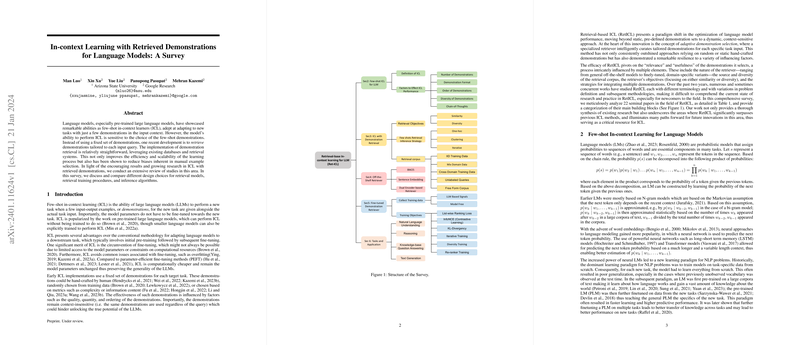Introduction
Few-shot in-context learning (ICL) is a capability of LLMs to adapt to new tasks using a limited number of demonstrations. This capability eludes the need for task-specific fine-tuning, presenting several advantages including resource efficiency and mitigating overfitting. Traditional ICL approaches use fixed demonstrations for all queries, leading to suboptimal use of the LLMs' potential. This survey provides an exhaustive review of a burgeoning variation: Retrieval-based ICL (RetICL), where tailored demonstrations are selected dynamically for each query to optimize model performance.
Few-shot In-context Learning for LLMs
LLMs have been pre-eminent in handling few-shot learning scenarios where models infer based on a handful of demonstrations without parameter updating. Despite significant strides, the success of ICL hinges on the quality, quantity and diversity of demonstrations. This calls for techniques that shift from static to dynamic, query-oriented demonstration selection. RetICL intends to maximize the relevance and usefulness of these demonstrations by considering key elements such as retrieval model complexity, diversity of the retrieval corpus and the retriever’s objectives during the selection process.
In-context Learning with Demonstration Retrieval
RetICL involves selecting demonstrations in alignment with the input query. Various strategies materialize this objective, with methods spanning one-hoc retrieval, clustering retrieval, and iterative retrieval. They differ in how demonstrations are selected—either independently, through clustering for diversity, or iteratively to build upon the context of previously chosen demonstrations. The retrieval corpus is equally vital and can range from in-domain, mix-domain, and cross-domain to raw text and unlabelled queries. Advanced RetICL techniques employ fine-tuning of retrieval models to curate training data, with the focus shifting towards training objectives that can range from InfoNCE loss to distillation by KL divergence, aiming for relevancy and diversity.
Applications and Future Directions
RetICL has established efficacy across several task categories including natural language understanding, reasoning, knowledge-based QA, and text generation. Challenges persist in corpus creation, retriever choice, training methods, and the need for active learning integration. Future research must resolve these challenges while also enhancing our theoretical comprehension of why similar demonstrations derived from retrieval methods outperform random selection, and how RetICL can be adapted to smaller models without sacrificing performance.
The insights gleaned from RetICL expose the remarkable yet untapped potential of LLMs when demonstrations are chosen with an informed, context-sensitive retrieval strategy. The exploration of this domain is poised to refine our understanding and utilization of LLMs, pushing the boundaries of AI and its application within complex, resource-constrained environments. This survey encapsulates the current state while guiding future developments in the evolving landscape of in-context learning.
